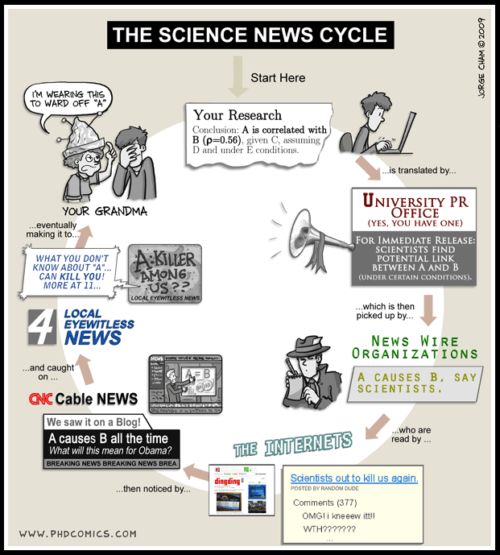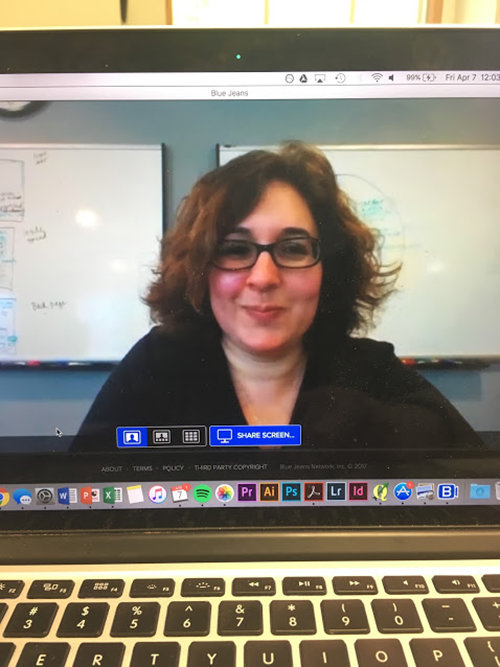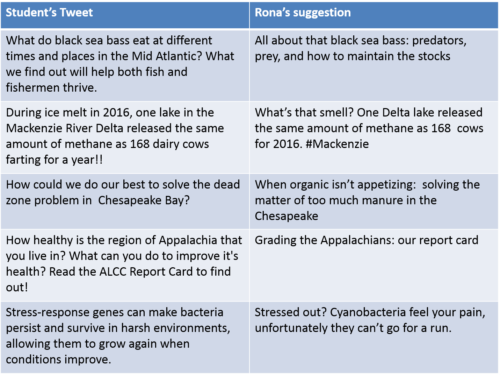Journalists and scientists: Forever at odds, or a perfect pairing?
Juliet Nagel, Kavya Pradhan · | Environmental Literacy | Science Communication | 9 commentsJuliet Nagel and Kavya Pradhan
Ask a scientist, and they might tell you that journalists are more interested in selling news than getting a story right, are overly concerned with conflict and scientific outliers, and will miss the point or twist information to fit a headline. Ask a journalist, and they might tell you that scientists are forever speaking in jargon that no one else understands, don’t care about the big picture, and are more interested in impressing their peers than communicating with the rest of the world. Scientists live in a world dealing with specifics, rational arguments, and a constant search for data, where it takes months or years to publish peer-reviewed findings. Journalists live in a world looking for generalizations, emotional perspectives, and a constant search for stories, where the headlines are published daily. How can these two groups see eye to eye?

Last Friday, in our graduate class on Science for Environmental Management, we had the amazing opportunity to talk to Rona Kobell, a staff writer at the Bay Journal. Rona has also written for Public Risk and the Baltimore Sun, and spent a year at the University of Michigan studying the use of economic incentives on environmental policy1. The Bay Journal has been covering environmental issues surrounding the Chesapeake Bay for over 25 years2, including stories about horseshoe crabs, oysters, aquaculture, funding, restoration, and more. In recent news, Rona reported on the controversy surrounding the firing of Maryland’s crab program manager, Brenda Davis3.

Rona was full of insights for our class as we are developing our scientific careers. Here are a few tidbits of knowledge gleaned from our discussion:
- Capturing an audience’s attention is all about the first paragraph, or what journalists call “the lead,” so make sure it is good! This can also apply to scientific papers. If you don’t get your point across in the abstract, and get mired down in the details, most will lose interest and move on.
- DON’T use jargon when talking about your research. People don’t like to admit when they don’t understand something, or they may think they get it, but what they hear is not what you meant to say. For example, instead of “excess nutrients,” say “pollution.”
- Relate your research to your life. Tell a story about your own experience to show why it is important.
- “The Media” often has negative connotations to it, but reporters are people too, and as people, not all reporters are the same. Building working relationships with reporters that you find trustworthy will be rewarding for both of you.
- “Fake News” is not the same thing as “News that you don’t agree with.”
- Most reporters do not like email interviews, and don't want to be told “I’ll send you my paper.” As Rona said, “You can’t question a PDF.”
In addition to discussing many aspects of reporting and scientific journalism, our class did a few mock interviews, and also discussed Twitter, a news and social media service actively used by over 300 million people4. Twitter can be a great way to share information about your research, but it comes with its own challenges. Tweets are restricted to 140 characters, so you need to be creative to get your message across. Keep it simple, keep it catchy, and avoid using acronyms and impolite words (fart, for example).

With today’s proliferation of short stories on social websites and other nontraditional news outlets, in-depth stories are becoming harder to find, and reporters who write them are increasingly rare. Now more than ever, though, it is so important to communicate scientific research in a way that people understand. Science journalists have the ability to do this. It seems clear to me that scientists and journalists can learn so much from one another, and we need each other. We are indeed a perfect pairing.
References:
1. Bay Journal: About Us http://www.bayjournal.com/about
2. Bay Journal Media, Inc.: Chesapeake Bay Journal http://www.bayjournal.com/chesapeakemediaservice
3. Kobell, Rona. 22 February 2017. Maryland’s veteran crab manager fired after watermen complain to Hogan http://www.bayjournal.com/article/marylands_veteran_crab_manager_fired_after_watermen_complain_to_hogan
4. Twitter Usage: Company Facts. https://about.twitter.com/company
Next Post > Atlantic Estuarine Research Society meeting at St. Mary's College of Maryland
Comments
-
Qiurui 9 years ago
Nice blog. It covers everything we discussed in class. I especially like the first paragraph, which was developed through the comparison between scientists and journalists, and how they see each other in their eyes.
-
Hadley McIntosh 9 years ago
Great blog Juliet! These keep getting better each week. While I really enjoyed our talk with Rona, I think the original version of my Tweet using "fart" was OK. I understand not wanting to use such language due to it's crassness, but it does get the point across. Everyone I talk to knows what I'm talking about when I use the word. I gave my first brown-bag lecture at CBL talking about "Arctic Lake Farts" or "ALFs" and used the character from the 1980s-1990s sitcom throughout.
-
Jake Shaner 9 years ago
Good synthesis of the wide range of topics we covered. I like that you reiterated the point Rona made about the importance of verbal conversation, either by phone or in person. That is something my generation and subsequent ones are struggling with. With so many other methods of communication, it is hard to remember how verbal communication can share more than just words.
-
Hao Wang 9 years ago
Very good blog. It covers what we discussed during the class.Figure 1 raised the problem between the scientists and journalists and it will highlight the importance of good communication.
-
Alterra Sanchez 9 years ago
Juliet Nagel and Kavya Pradhan, this blog is wonderful. I didn't get to speak to Rona, unfortunately, but I feel I really get the discussion you all had. The biggest takeaway I get from it is that even when we think we are communicating our science appropriately with the public, chances are we aren't unless we get feedback from... the public! This was very evident from the feedback on the tweets from Rona.
-
Kavya Pradhan 9 years ago
Great job Juliet! I really liked the fact that journalists and scientists are set up as opposites in the beginning of this blog, but by the end you show how those opposite traits need to be seen as complimentary rather than antagonistic. One thing that I had not thought of was the differences in the amount of time it takes to do research versus the time constraint for producing news pieces.
-
Stephanie 9 years ago
I can definitely see that some of Rona's tips influenced how you wrote this article and it turned out great! It's catchy and concise. Also, you've got to love that comic.
-
Katie Martin 9 years ago
Great job with the tweet comparisons and comic selection. The comparison between the abstract and lead highlighted the similarities between journalists and scientists. It really is similar to a lead in terms of grabbing attention. Scientists won't bother reading a publication if the purpose and conclusion aren't obvious from the abstract.
-
Ginni La Rosa 9 years ago
Nicely written article! I enjoyed hearing the firsthand perspective of a journalist who is dedicated to making the facts available to readers from a diverse range of perspectives and backgrounds. The conversations have encouraged me all the more to make use of the 'message box' tool we have discussed previously to explain my research as clearly as possible.